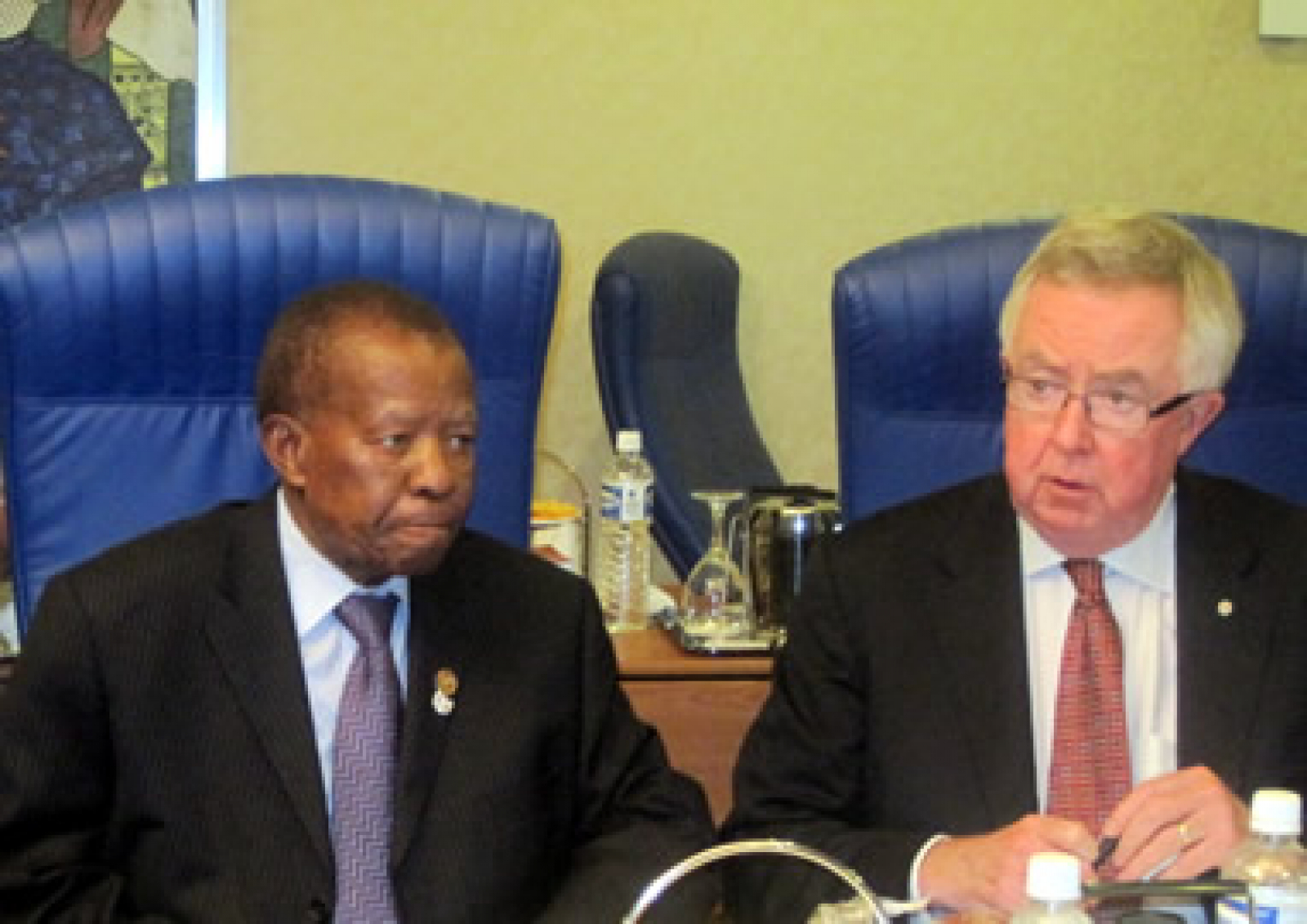
SHARE
Noting heightened interest and determination among Nigerians to overcome the nation's history of flawed elections, a pre-election assessment mission conducted by NDI also identified a number of hurdles that could undermine a successful process surrounding next year's state and national polls.
"There is a deepening sense of the need to change the approach to elections in Nigeria," the delegation said in a statement released at a press conference in Abuja on Oct. 15. "Many political actors expressed concern that the legacy of flawed elections has a negative impact on Nigeria's political and economic development, as well as its standing in the world."
The statement reflected the findings of the pre-election assessment mission, which was conducted in Nigeria from Oct. 11-15 and was composed of political and civic leaders and democracy and election experts from Africa, Asia and North America. It was co-led by Sir Ketumile Masire, former president of Botswana, and the Right Honourable Joe Clark, former prime minister of Canada.
"The delegation observed that while many Nigerians are determined to actively participate in the 2011 elections, they are fearful that verbal commitments to electoral reform may not translate into concrete actions. The delegation found a sense of urgency among Nigerians to see demonstrable steps in election preparation," the statement said.
But the delegation highlighted problems that it said could undermine a successful election process, including delayed agreement on the legal framework for the election, security and policing throughout the electoral process, and the efficiency of Independent National Electoral Commission (INEC) organs at the local government, constituency and ward levels.
The delegation also pointed to continuing uncertainty over when the election will actually be held as the National Assembly considers whether to postpone the polls from January to April 2011. This "continuing uncertainty surrounding the electoral timetable could render planning even more difficult for all electoral stakeholders and potentially diminish the enthusiasm of potential voters," the delegation said.
It also noted that "a cardinal aspect of the electoral process, voter registration, has yet to begin" for the estimated voting age population of 70 million. "Many Nigerians worry that the logistical and capacity challenges associated with INEC's plans to develop a new, electronically-based voter register could further delay the registration process," the statement said.
As Nigeria's election preparations move forward, the delegation issued a number of recommendations. They included:
- Nigeria's leadership should continue to affirm its commitment to free, fair and credible elections.
- The government should make clear that electoral misconduct by public officials, politicians, and members of the security services will not be tolerated.
- The National Assembly and state assemblies should act to permit postponement of the elections from January 2011 to a later date.
- INEC should continue to enhance and facilitate regular and open communications with political parties, civil society, security services, media, the public and other election stakeholders, and develop a voter education program.
- Election observers should be granted accreditation well before the start of voter registration and observers should be guaranteed access to registration centers, polling stations, and tabulation facilities.
- Security services should require that all officers remain neutral, avoid intimidating voters and ensure that priority during elections is placed on protecting civilians.
- Political parties should consider measures to reduce politically motivated violence.
Other members of the delegation include Christiana Thorpe, chairman of the Sierra Leone Election Commission; Peter Lewis, director of the African studies program at the School of Advanced International Studies at Johns Hopkins University; Nazmul Kalimullah civil rights activist and professor at the University of Dhaka, Bangladesh; Christopher Fomunyoh, NDI senior associate and regional director for Central and West Africa; and Barrie Freeman, NDI deputy regional director for Central and West Africa.
The delegation met with the chairman and senior officials of the INEC, political party leaders, members of the National Assembly, presidential aspirants, civic and religious leaders, government officials, the acting inspector general of police, journalists, academics, citizen election observer groups, development partners and the Economic and Financial Crimes Commission.
Pictured above: Sir Ketumile Masire, former president of Botswana, and the Right Honourable Joe Clark, former prime minister of Canada
Published October 15, 2010


